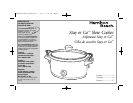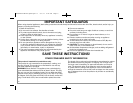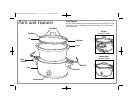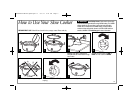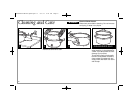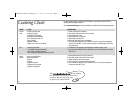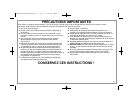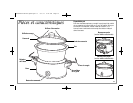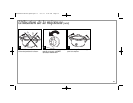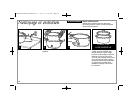
7
Tips for Slow Cooking
• The crock should be at least half-filled for best results. If only half-
filled, check for doneness 1 to 2 hours earlier than recipe time.
• Stirring is not necessary when slow cooking. Removing glass
lid results in major heat loss and the cooking time may need to
be extended. However, if cooking on High, you may want to stir
occasionally.
• If cooking soups or stews, leave a 2-inch (5-cm) space between
the top of the crock and the food so that the recipe can come to
a simmer.
• Many recipes call for cooking all day. If your morning schedule
doesn’t allow time to prepare a recipe, do it the night before.
Place all ingredients in crock, cover with lid, and refrigerate
overnight. In the morning, simply place crock in slow cooker.
• Some foods are not suited for extended cooking in a slow cooker.
Pasta, seafood, milk, cream, or sour cream should be added 2
hours before serving. Evaporated milk or condensed soups are
perfect for slow cooking.
• The higher the fat content of meat, the less liquid is needed. If
cooking meat with a high fat content, place thick onion slices
underneath so meat will not sit on (and cook in) fat.
• Slow cookers allow for very little evaporation. If making your
favorite soup, stew, or sauce, reduce liquid called for in original
recipe. If too thick, liquid can be added later.
• If cooking a vegetable-type casserole, there will need to be liquid
in the recipe to prevent scorching on the sides of crock.
• If cooking a recipe with root vegetables, place root vegetables in
the bottom of the crock.
Food Safety Tips
• Do not use frozen, uncooked meat in the slow cooker. Thaw any
meat or poultry before slow cooking.
• Visit www.foodsafety.gov for more information on safe internal
cooking temperatures.
• To store leftovers after cooking, do NOT place the entire crock in the
refrigerator since contents will take too long to cool. Instead, divide
leftovers into smaller containers and place into refrigerator.
• Never allow undercooked or raw meat to sit at room temperature
in the slow cooker. Once meat is placed into the crock, it should be
cooked immediately (unless prepping slow cooker the night before,
where crock should be placed into the refrigerator).
IF YOU LIVE IN A HIGH-ALTITUDE AREA:
The Extension service will have detailed information about cooking
for your area. To locate the Cooperative Extension service in your
county, please visit: http://www.csrees.usda.gov/Extension/.
840204900 ENv02.qxd:Layout 1 6/7/11 2:31 PM Page 7



